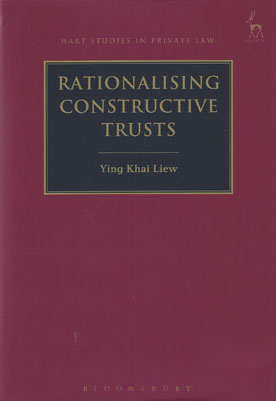
It is trite that constructive trusts significantly interfere with the rights of an apparent legal owner of property. This makes it necessary for their imposition to be properly rationalised. Unfortunately, a generally accepted justificatory framework has yet to be attained.
Rationalising Constructive Trusts proposes a new structure for a coherent understanding of constructive trusts. By exploring the real-world events which trigger constructive trusts, as well as analysing how constructive trusts relate to parties' rights and duties, it provides answers to a number of crucial questions.
For example: What are the ingredients of a constructive trust claim? What are the limits of constructive trusts? How can we rationalise the imposition of constructive trusts in particular situations? Why do judges exercise different degrees of remedial discretion in different doctrines?
From a wider perspective, it explains how the renewed understanding helps us to appreciate the precise ambit and role of express, constructive, and resulting trusts.
Announced as Agreement-Based Constructive Trusts